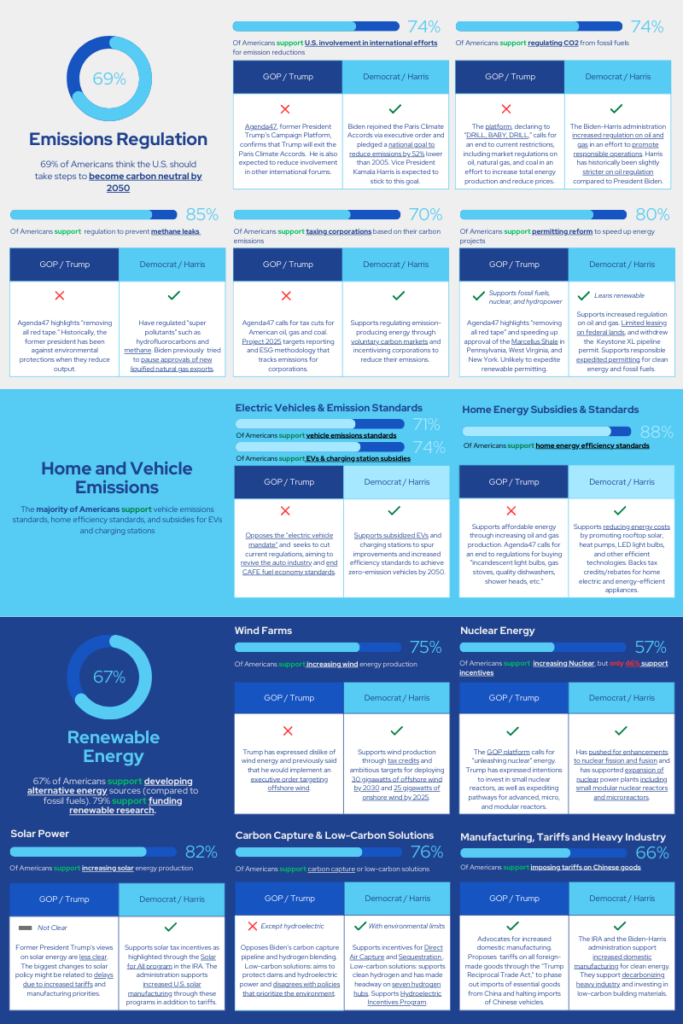
Comparing the 2024 Presidential Candidates’ Energy Agendas
Explore a comprehensive analysis of the 2024 presidential candidates' energy policies. From deregulation to clean energy investment, discover how each candidate's agenda could shape America's energy future.
The 2024 GOP Platform supports deregulation and incentives for traditional energy sources like coal, oil, natural gas, and some renewables. During the former President’s term, he rolled back more than 100 environmental rules and former Trump colleagues have outlined a plan to continue to do the same. The Republican Vice Presidential candidate, JD Vance, has shown limited support for or opposition to most climate policies but has supported regulation as a response to environmental health, such as toxic spills.
The Biden-Harris administration supports investment in clean energy through the Inflation Reduction Act and various initiatives, including Justice40, which supports environmental justice efforts. Vice President Harris is expected to continue these actions with a potentially more progressive climate stance if elected. She previously supported a fracking ban, but has since reversed her opinion. Harris may emphasize environmental justice in her campaign but has yet to provide a formal plan. The Democratic Vice Presidential candidate, Tim Walz, has mostly aligned with Biden-Harris policies, at times going further to cut emissions, while also working with oil companies to rebuild the Line 3 pipeline project.
Meanwhile, as of 2023, most Americans want the U.S. president to do more to address global warming.
The President can enact or dismantle energy policy in various ways. Here is a comparison of the candidates’ energy policies and the mechanisms they might use. (Harris’s specific 2025 energy policy goals are not included.)

Easy to Execute
Executive Order and Agency Regulation
Targeted Policies:
- Emissions targets
- International agreements and participation
- Agency initiatives and organization
Regulating emissions can be targeted through executive orders, like Order 14057, or actions. Trump plans to exit the Paris Climate Accords and remove U.S. emissions targets, which are currently set to be reduced by 52% by 2030. During former President Trump’s term, his administration rolled back more than 100 environmental rules, and Project 2025, a document created by the Heritage Foundation, outlines a plan to continue this effort.
Project 2025 aims to remove renewable research or other science research groups within the Department of Energy. While the president has reorganization authority, there could be challenges with leaving allocated funding unused if the IRA already specified this money.
While Americans have mixed views on natural gas, oil, and drilling, most support taxing polluters. Both candidates support “energy independence” and reducing reliance on other countries. Both the Biden and Trump administrations have overseen a time in which the U.S. has led global oil production.
A Trump presidency could reduce regulation and hurdles for oil and gas companies. Trump has called for tax cuts for U.S. oil and gas companies. Executive orders and rewriting the tax code could accomplish these goals, but they may require congressional support.
A Harris presidency could continue to face legal battles on permitting action, such as limiting leasing on federal lands, withdrawing the permit for the Keystone XL pipeline, and pausing approvals of new liquified natural gas exports. Harris has historically been slightly stricter on oil regulation than President Biden.
Both parties support expedited permitting, with Trump preferring traditional fuels, often done through an executive order instructing how agencies act on legislation.
Moderately Difficult to Achieve
Tax Regulation and Unallocated Congressional Funding
Targeted Policies:
Renewable energy project funding
Efficiency standards for homes and vehicles
Many proposed policies can be achieved through re-writing the tax code, pausing non-obligated funds, or changing how federal agencies allocate loans. Due to the recent ruling overturning Chevron deference, Trump would have more capacity to do so in this term, while Harris may see challenges disseminating funds where policy is ambiguous.
The IRA and Creating Helpful Incentives to Produce Semiconductors and Science (CHIPS) Act are unlikely to be canceled without congressional action. A second Trump term would face challenges to repeal promised tax breaks completely, such as tax credit eligibility for electric vehicles, efficient vehicles, or appliances.
Generally, renewable projects like solar farms may face delays due to increased tariffs and shifting manufacturing priorities. Trump has previously expressed that he would implement an executive order targeting offshore wind. Still, it would be difficult to do more than pause loans and rewrite tax laws to slow the trajectory of renewable production.
With bills such as the IRA, CHIPS Act, and related executive orders already in place, continuing these efforts under a Harris presidency would likely not be as difficult as removing them.
Difficult to Accomplish
Withhold Congressional Spending
Former President Trump has pledged to cut wasteful spending within the federal budget, which is interpreted to include dismantling specific agency sections and rules. Congress sets the federal budget, and the president does not have the authority to withhold appropriated spending. Such action would require significant effort from the other government branches.
While dismantling energy policy may be more difficult than during Trump’s 2016 term, emissions projections reflect a need to continue and potentially double renewable energy and decarbonization to meet 2050 targets.
Kayla Main
Kleinman Center Research AssistantKayla Main is a Research Assistant at the Kleinman Center. Through the Kleinman Center, she also works with Energia, an international network supporting gender equity and sustainable energy progress, and their partners, such as Solar Sister.

